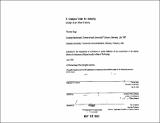| dc.contributor.advisor | Fernando Perez Domeyko. | en_US |
| dc.contributor.author | Kaup, Thomas | en_US |
| dc.contributor.other | Massachusetts Institute of Technology. Dept. of Architecture. | en_US |
| dc.date.accessioned | 2011-12-05T19:51:34Z | |
| dc.date.available | 2011-12-05T19:51:34Z | |
| dc.date.copyright | 1993 | en_US |
| dc.date.issued | 1993 | en_US |
| dc.identifier.uri | http://hdl.handle.net/1721.1/67416 | |
| dc.description | Thesis (M. Arch.)--Massachusetts Institute of Technology, Dept. of Architecture, 1993. | en_US |
| dc.description | Includes bibliographical references (p. 145-149). | en_US |
| dc.description.abstract | Whereas the separation of work from domestic life introduced during the industrial revolution has brought enormous increases in productivity through the division of labor, the cultural cost of this fracture for society is still underestimated. Some of the initial reasons for the phenomenon, namely unbearable environmental impact, inhumane working conditions and the monstrous scale of apparatus have started to lose significance through technological progress. The idea of industry as a constant state of emergency, for various reasons sometimes even embraced by old-style managements, has been recognized as an obstacle for efficiency in modem production. If this is true, what are the architectural implications? Being 'different' or 'somewhere else' is still considered an inherent characteristic of industry: architecturally, a factory-gate is still the entrance to another world. This thesis investigates an integrative approach. Rather than enhancing the outlandish, it argues for exploring a genuine industrial order with a strategy that understands size and complexity of the programmatic features of the organism as potential for opportunistic appropriation, interpretative continuation or value-driven contradiction of meaningful elements and qualities of the environment. The strategy relies on several principles borrowed from chaos theory such as fractional dimension, self-similar behavior of forms, non-linear growth, and others. | en_US |
| dc.description.statementofresponsibility | Thomas Kaup. | en_US |
| dc.format.extent | 153 p. | en_US |
| dc.language.iso | eng | en_US |
| dc.publisher | Massachusetts Institute of Technology | en_US |
| dc.rights | M.I.T. theses are protected by
copyright. They may be viewed from this source for any purpose, but
reproduction or distribution in any format is prohibited without written
permission. See provided URL for inquiries about permission. | en_US |
| dc.rights.uri | http://dspace.mit.edu/handle/1721.1/7582 | en_US |
| dc.subject | Architecture. | en_US |
| dc.title | A complex order for industry : design of an urban factory | en_US |
| dc.type | Thesis | en_US |
| dc.description.degree | M.Arch. | en_US |
| dc.contributor.department | Massachusetts Institute of Technology. Department of Architecture | |
| dc.identifier.oclc | 28738604 | en_US |
